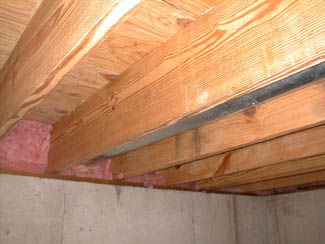Floor Squeak and Bounce Repair

Floor Squeak and Bounce Repair TIPS
- Building code is a set of minimum standards
- Not all joists have the same strength and stiffness - look at span tables
- WATCH floor squeak repair video below
- Screw subfloor to joists to eliminate most squeaks
- CLICK HERE to Get Tim's FREE & FUNNY Newsletter!
DEAR TIM: The wood floors in my new home are driving me crazy. When I walk across them they feel soft and bounce up and down.
Some places actually squeak. The building inspector has indicated the floors do indeed meet the building code.
What in the world can be done now to stiffen the floors so they feel more solid? Do I have to start over? What should have been done to prevent both problems? Dewey B., Birmingham, AL
DEAR DEWEY: I can absolutely understand your frustration and disappointment.
New Should Be Defect-Free
Anytime we buy something new, it is perfectly normal to have high expectations with respect to the final fit and finish of a product. When it comes to a new home, one would tend to assume the floors would be solid and squeak-free.
Unfortunately, your expectations, and those of tens of thousands of other homeowners, are in conflict with the building code. I wish it were not so, but it is reality.
Building Code = Minimum Standards
I happen to have a high regard for the building code. It is a fantastic document in many respects. I count among many of my friends several retired and active building inspectors.
But one thing I've learned in all of my years in the industry is the building code is a set of minimum standards.
FREE & FAST BIDS
70 % Test Grade
A builder who works within the code is simply passing a series of tests each time an inspection is scheduled. To pass the code inspections or tests, a builder simply has to obtain a grade of 70 percent as one would in a school exam or test.
In fact, the system is actually more basic: You either pass the inspection or you fail it. The contract you signed with your builder may not require him to get a better score. You can make that happen by specifying better materials and installation methods that exceed code requirements.
Minimum Span Tables
The building code has a detailed section dealing with wood floor design. It calls out the maximum distance floor joists can span for different sized lumber set at different spacings.
You can see all of this complexity if you look at lumber span tables. Beware, they might make your eyes hurt!
There are span tables for different species of lumber. Here are span tables for southern yellow pine. It's a very strong wood.
Check out this set of span tables. It has Douglas Fir and other species in it. Note the difference between Douglas Fir and the others!
Grade & Species Differences
What's more, it indirectly talks about the grade and species of lumber. Keep in mind that different species and grades of lumber have a wide range of strength characteristics for identically sized pieces of lumber.
A 2x8 made from dense select Douglas fir-larch will perform quite differently than say an identical sized piece of #2 Ponderosa pine. The floor joists permitted by code allow safe floors to be built that are soft and spongy. But most people want solid and safe floors.
Removing Bounce
Taking the bounce out of the floors will not be easy. It can be done, but it will require significant modifications since your home is now complete.
The engineering solutions to make it happen are as abundant as applause at a grade school play. You or your builder will need to consult with a structural engineer that has extensive residential experience with wood floor systems.
Residential Structural Engineers
To insure that you'll be satisfied, ask the engineer for a few references. Call the homeowners and ask them if the engineer's solution produced floors that were sound and stiff.
This is very important and you'll be paid back in spades if you take this extra time.
Squeaks Are Easier
The secondary squeaking problem is more of a nuisance than anything. The squeaks can almost always be traced to nails driven through the sub-flooring into the floors joists.
For any number of reasons, the nails may have withdrawn slightly or the subfloor was never fastened tightly to the joists. As you walk across the floor, your weight causes the subfloor to slide up and down the nail shafts. This slight movement produces the agonizing squeak.
Floor Squeak Video
Watch this video to see a simple DIY floor squeak solution. It works most of the time.
Tiny Slits In Carpet
If your finished flooring surface is carpeting, you can solve the problem by driving screws through the subfloor into the floor joists. To prevent the carpet fibers from pulling, you need to make a precise surgical slit in the carpet backing before you drive each screw.
Squeaks in floors covered with tile, hardwood, sheet vinyl laminate, etc. are almost impossible to fix without removing the finished floor or parts of it.
Avoid Problems
These problems could have been avoided in the planning and construction phase. A seasoned architect and builder might have specified a floor joist package that would have produced the firmness you wanted.
If you would have discovered the spongy feel during a walk-through just after the framing was complete, simple engineering solutions could have been enacted at a low cost.
The squeaks could have been totally prevented if the builder had installed coarse-threaded screws through the subfloor into the floor joists just before the finish flooring was installed. Unfortunately, hindsight is always 20/20.
Great Sub-Floor Adhesive
When building, be sure to use a high-quality sub-floor adhesive. Click the following image to see them. The more expensive ones are usually contain better ingredients.

There are quite a few subfloor adhesives. Here's one way to locate the best one. The BEST ONES usually contain MORE of the GREAT INGREDIENTS so they cost more. Use price as your barometer. CLICK THE IMAGE TO ORDER SOME ADHESIVE NOW AND IT WILL BE DELIVERED TO YOU.
Related Column = Preventing Squeaky Floors
Column 467
One Response to Floor Squeak and Bounce Repair